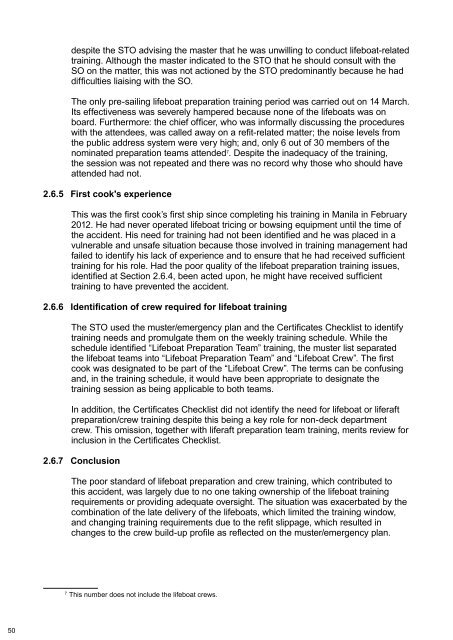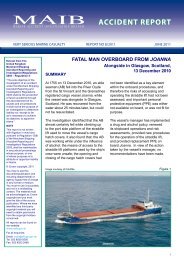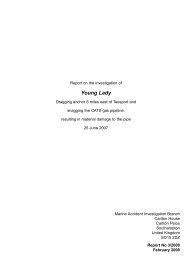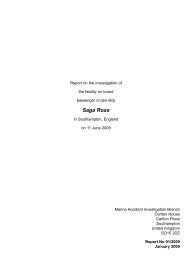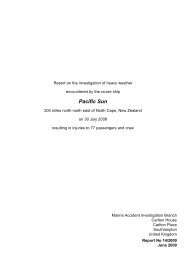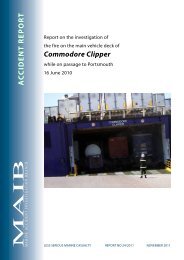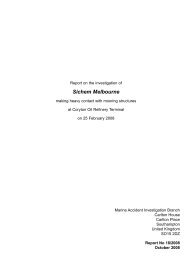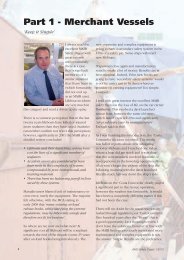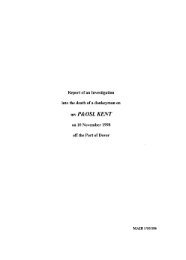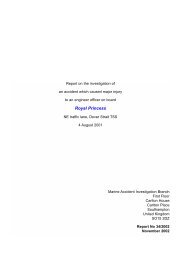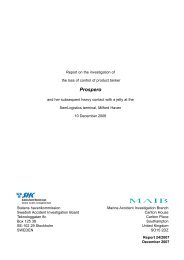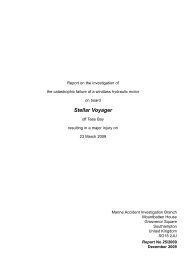SECTION 4 - Marine Accident Investigation Branch
SECTION 4 - Marine Accident Investigation Branch
SECTION 4 - Marine Accident Investigation Branch
You also want an ePaper? Increase the reach of your titles
YUMPU automatically turns print PDFs into web optimized ePapers that Google loves.
50<br />
despite the STO advising the master that he was unwilling to conduct lifeboat-related<br />
training. Although the master indicated to the STO that he should consult with the<br />
SO on the matter, this was not actioned by the STO predominantly because he had<br />
difficulties liaising with the SO.<br />
The only pre-sailing lifeboat preparation training period was carried out on 14 March.<br />
Its effectiveness was severely hampered because none of the lifeboats was on<br />
board. Furthermore: the chief officer, who was informally discussing the procedures<br />
with the attendees, was called away on a refit-related matter; the noise levels from<br />
the public address system were very high; and, only 6 out of 30 members of the<br />
nominated preparation teams attended 7 . Despite the inadequacy of the training,<br />
the session was not repeated and there was no record why those who should have<br />
attended had not.<br />
2.6.5 First cook's experience<br />
This was the first cook’s first ship since completing his training in Manila in February<br />
2012. He had never operated lifeboat tricing or bowsing equipment until the time of<br />
the accident. His need for training had not been identified and he was placed in a<br />
vulnerable and unsafe situation because those involved in training management had<br />
failed to identify his lack of experience and to ensure that he had received sufficient<br />
training for his role. Had the poor quality of the lifeboat preparation training issues,<br />
identified at Section 2.6.4, been acted upon, he might have received sufficient<br />
training to have prevented the accident.<br />
2.6.6 Identification of crew required for lifeboat training<br />
The STO used the muster/emergency plan and the Certificates Checklist to identify<br />
training needs and promulgate them on the weekly training schedule. While the<br />
schedule identified “Lifeboat Preparation Team” training, the muster list separated<br />
the lifeboat teams into “Lifeboat Preparation Team” and “Lifeboat Crew”. The first<br />
cook was designated to be part of the “Lifeboat Crew”. The terms can be confusing<br />
and, in the training schedule, it would have been appropriate to designate the<br />
training session as being applicable to both teams.<br />
In addition, the Certificates Checklist did not identify the need for lifeboat or liferaft<br />
preparation/crew training despite this being a key role for non-deck department<br />
crew. This omission, together with liferaft preparation team training, merits review for<br />
inclusion in the Certificates Checklist.<br />
2.6.7 Conclusion<br />
The poor standard of lifeboat preparation and crew training, which contributed to<br />
this accident, was largely due to no one taking ownership of the lifeboat training<br />
requirements or providing adequate oversight. The situation was exacerbated by the<br />
combination of the late delivery of the lifeboats, which limited the training window,<br />
and changing training requirements due to the refit slippage, which resulted in<br />
changes to the crew build-up profile as reflected on the muster/emergency plan.<br />
7 This number does not include the lifeboat crews.


